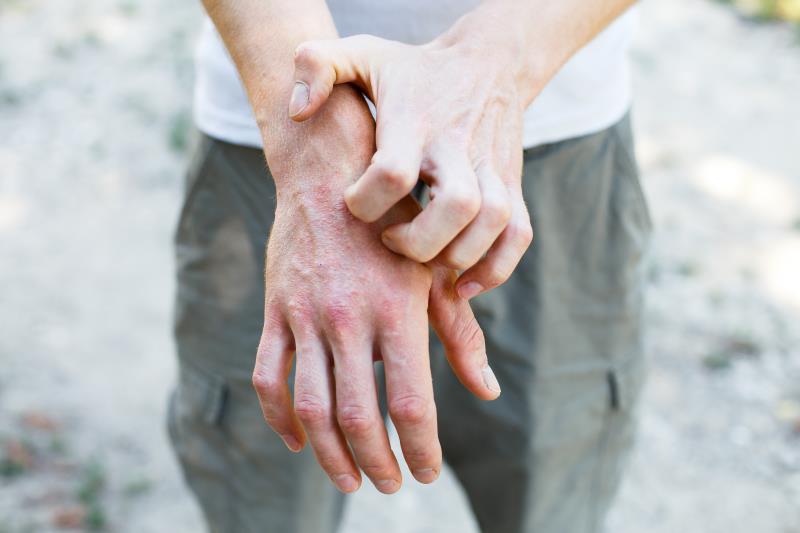
A 300 mg QW or Q2W maintenance dupilumab regimen is less likely to result in worsening of atopic dermatitis (AD) than switching to a Q4W or Q8W regimen, results of the phase III LIBERTY AD SOLO-CONTINUE* trial show.
“[T]he approved [Q2W] treatment regimen is the lowest dosage regimen associated with consistent maintenance of clinical response in this trial and is therefore recommended for long-term treatment,” said the researchers, noting that there was no apparent clinical response benefit with weekly vs the every-2-week regimen.
“Less frequent administration [Q4W or Q8W] resulted in reduced efficacy, no safety advantages, and numerically higher treatment-emergent antidrug antibodies (ADAs) incidences,” they pointed out.
Study participants were 422 adults (mean age 38.2 years, 53.8 percent male) with moderate-to-severe AD who had achieved an IGA score of 0 or 1 or EASI-75** at 16 weeks following treatment with subcutaneous dupilumab in the LIBERTY AD SOLO 1 and 2*** trials. At week 16 (SOLO-CONTINUE baseline), patients were re-randomized to continue their original dupilumab dose regimen (300 mg QW or Q2W), or receive dupilumab at 300 mg Q4W or Q8W, or placebo for 36 weeks.
When compared with SOLO-CONTINUE baseline, dupilumab QW or Q2W for 36 weeks resulted in minimal change in the EASI improvement that was achieved during SOLO (-0.06 percent; p<0.001 vs placebo). In contrast, patients who received dupilumab Q4W or Q8W experienced greater worsening of their condition (-3.84 percent and -6.84 percent, respectively), while placebo recipients worsened by -21.67 percent from levels achieved in SOLO. [JAMA Dermatol 2019;doi:10.1001/jamadermatol.2019.3617]
EASI-75 response at SOLO-CONTINUE baseline was maintained at week 36 by more patients on dupilumab QW or Q2W (71.6 percent; p<0.001 vs placebo) than those on Q4W (58.3 percent; p<0.001), Q8W (54.9 percent; p=0.004), or placebo (30.4 percent).
At week 35, there was minimal change in Peak Pruritus NRS from SOLO-CONTINUE baseline among patients on the QW or Q2W regimens (0.1 percent; p<0.001), while patients on the Q4W (-8.6 percent; p<0.001), Q8W (-16.7 percent; p<0.001) and placebo (-35.6 percent) regimens experienced pruritus recurrence.
Overall, IGA scores were maintained by more dupilumab than placebo recipients, with more patients on dupilumab QW or Q2W (70.6 percent; p<0.001), Q4W (62.1 percent; p<0.001), or Q8W (50.0 percent; p<0.05) maintaining their scores within 1 point of baseline at week 36 than those on placebo (28.6 percent).
The QW or Q2W regimens also appeared better than the Q4W or Q8W regimens in terms of quality of life, pain or discomfort, or sleep disturbance at week 36. Dupilumab QW/Q2W recipients were the least likely to use rescue medication (19.5 percent vs 48.2 percent [placebo]).
Treatment-emergent adverse events (TEAEs) were also least frequent among QW/Q2W recipients (70.7 percent) compared with 73.6, 75.0, and 81.7 percent in the Q4W Q8W, and placebo groups, respectively. Serious TEAEs were reported by 3.3 percent of patients. Skin infections and AD were more frequent among placebo recipients, and nasopharyngitis, injection-site reactions, herpes simplex infection, and headache more frequent with dupilumab. Treatment-emergent ADAs were least frequent in the QW and Q2W groups (1.2 and 4.3 percent, respectively) compared with Q4W, Q8W, and placebo groups (6.0, 11.7, and 11.3 percent, respectively).
“[This indicates] a higher incidence of immunogenicity with less frequent dosage intervals,” said the researchers, noting that no new safety signals emerged in this trial.
They also pointed out that a 16-week dupilumab QW or Q2W regimen appears insufficient to achieve stable remission, given the reduction in efficacy experienced by patients who received dupilumab in the SOLO trials and were assigned to placebo in SOLO-CONTINUE.
They also noted that the participants had already achieved “stringently defined responses” in the SOLO trial and as such, the results may not apply to all patients with AD treated with dupilumab.